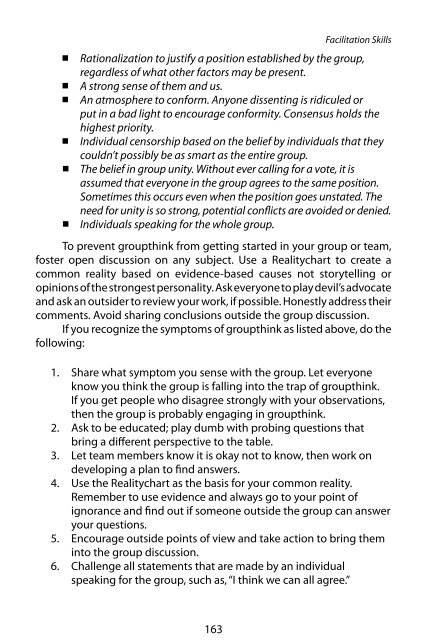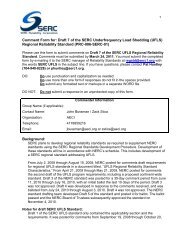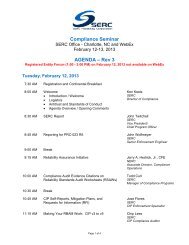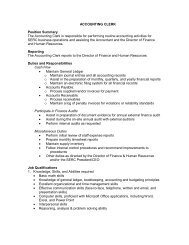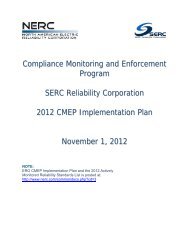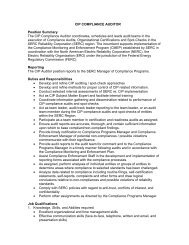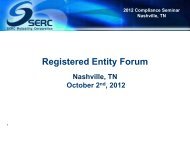RealityCharting e-book .pdf - SERC Home Page
RealityCharting e-book .pdf - SERC Home Page
RealityCharting e-book .pdf - SERC Home Page
- No tags were found...
Create successful ePaper yourself
Turn your PDF publications into a flip-book with our unique Google optimized e-Paper software.
n<br />
n<br />
n<br />
n<br />
n<br />
n<br />
Facilitation Skills<br />
Rationalization to justify a position established by the group,<br />
regardless of what other factors may be present.<br />
A strong sense of them and us.<br />
An atmosphere to conform. Anyone dissenting is ridiculed or<br />
put in a bad light to encourage conformity. Consensus holds the<br />
highest priority.<br />
Individual censorship based on the belief by individuals that they<br />
couldn’t possibly be as smart as the entire group.<br />
The belief in group unity. Without ever calling for a vote, it is<br />
assumed that everyone in the group agrees to the same position.<br />
Sometimes this occurs even when the position goes unstated. The<br />
need for unity is so strong, potential conflicts are avoided or denied.<br />
Individuals speaking for the whole group.<br />
To prevent groupthink from getting started in your group or team,<br />
foster open discussion on any subject. Use a Realitychart to create a<br />
common reality based on evidence-based causes not storytelling or<br />
opinions of the strongest personality. Ask everyone to play devil’s advocate<br />
and ask an outsider to review your work, if possible. Honestly address their<br />
comments. Avoid sharing conclusions outside the group discussion.<br />
If you recognize the symptoms of groupthink as listed above, do the<br />
following:<br />
1. Share what symptom you sense with the group. Let everyone<br />
know you think the group is falling into the trap of groupthink.<br />
If you get people who disagree strongly with your observations,<br />
then the group is probably engaging in groupthink.<br />
2. Ask to be educated; play dumb with probing questions that<br />
bring a different perspective to the table.<br />
3. Let team members know it is okay not to know, then work on<br />
developing a plan to find answers.<br />
4. Use the Realitychart as the basis for your common reality.<br />
Remember to use evidence and always go to your point of<br />
ignorance and find out if someone outside the group can answer<br />
your questions.<br />
5. Encourage outside points of view and take action to bring them<br />
into the group discussion.<br />
6. Challenge all statements that are made by an individual<br />
speaking for the group, such as, “I think we can all agree.”<br />
163


